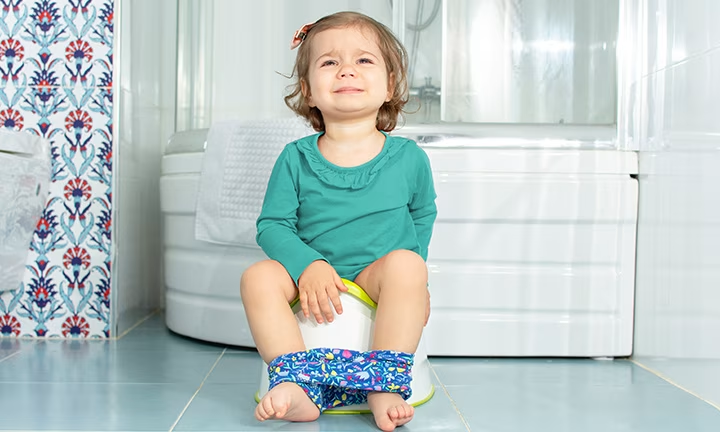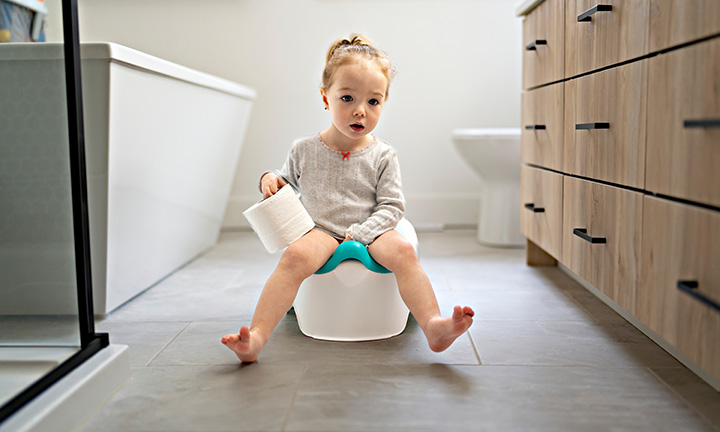
How to Deal With Potty-Training Regression
The potty-training process can have its ups and downs for many young children. Just when you think potty training has been established – a little accident happens! These dips or lapses are sometimes called potty-training regression – a period when your child aged 2-, 3-, 4-, or 5 years old won't use the potty or starts to have accidents again. Learn about what can cause potty-training regression, and how to deal with it and get your child back on track.
What Is Potty-Training Regression?
If your child was on a winning streak with potty training recently – meaning they were able to communicate their needs, show an interest in the bathroom, and were using the potty successfully – it may feel quite disheartening if they suddenly start having accidents again or refusing to use the potty.
This is often known as potty-training or toilet-training regression and can be identified by a sudden rejection of potty routines, an increase in accidents, or even a desire to go back to using nappies. This can happen at home or even when they’re at nursery.
Accidents Happen!
It’s important to remember that accidents happen! It’s all part of a child’s learning process. And whilst some children adapt quickly to new skills, others may have a few hiccups along the way – we’re all different.
Some toddlers and young children often have trouble recognising the urge to wee or poo and may not make it to the toilet in time, whilst others may simply have an accident if they get too excited or they’re absorbed in what they’re currently doing.
So, a key point to keep in mind is that many children will have an accident at some point during their potty-training journey. But if your child was successfully using the potty and has started having frequent accidents again, that may be considered a regression. Keep reading for some possible causes and helpful advice.
What Causes of Potty-Training Regression?
Potty training setbacks can be triggered by certain health conditions or emotional reasons, such as a change in routine. Here are some common reasons why potty-training regression might happen:
It’s important to consult with your child’s doctor to rule out any health or developmental issues.
Your little one may need to take some time to adjust to a new situation in their life, so it’s important to be patient and sympathetic before getting potty training back on track.
How to Deal With Potty-Training Regression
If potty training is going backwards and you’re wondering how to handle regressions, use these helpful tips to help you and your child manage things in a positive way and get back on track:
1. Identify the Problem
Look at the possible causes of why their potty training may have regressed that we listed above, and consider what may be causing your little one’s accidents. You may also want to consult your child’s GP for more advice and to rule out any health issues. Depending on your toddler’s age and how verbal and communicative they are, you could ask them to try to explain what they’re experiencing.
If your child is in nursery during the day, you can ask your little one and their nursery teachers if they’ve had any accidents there, or if there have been any changes in the nursery schedule or rooms.
Be positive and sympathetic when you discuss any accidents with your child and don’t push the subject if they are unwilling to talk about it.
2. Attempt to Solve the Issue
When dealing with potty-training regression, here are some things to consider that may help your child get back on track:
You can even ask your toddler for suggestions or ideas on how to solve their potty-training regression.
3. Set Clear Expectations
With a younger child, nonverbal cues and instructions are often the most effective. So, take steps such as having a potty close at hand and calmly sitting your child on it when you see they have the urge to go.
With an older child, you can go ahead and use your words. Simply give them gentle reminders to use the potty the next time. To help them along the way, offer hugs and praise when they use the potty, and consider using a potty-training sticker chart.
No matter how old your child is, remember to be positive and encouraging when they have accidents. Avoid using punishments or any negative language that may add to your little one’s stress or upset.
An Alternative to Returning to Nappies
If all else fails and you're thinking about going back to nappies for a while, you could try nappy pants for a few weeks until your little one is back on track.
Nappy pants may offer an extra level of confidence and can prevent embarrassing accidents without the need to return to nappies.
Alternatively, you can try Pampers Baby Dry Nappy Pants + (Plus Sizes) which feature extra-absorbent materials, meaning they can absorb more liquid at a faster rate. This is perfect if you’re looking to bridge the gap between two nappy sizes or if your little one is a heavy wetter.
Managing Your Own Expectations
If you’re wondering how to stop potty-training regression, it’s important to remember that accidents are normal, and many children have periods of regression. The key is to be patient, remain calm, consistent and positive when your child has accidents. No matter what, don’t get angry or punish your child for a potty-training accident.
Refocus your attention on your child and how you can support them, providing them with the information they need to understand that they can get back on track.
If you’re still experiencing potty-training problems with your child, don’t be afraid to consult their GP for advice. Parenting classes can also be a great resource during this time. Other parents will be more than happy to share their experiences when potty training their own children. Candid conversations can provide valuable insight into remedying your child’s potty-training regression.
FAQS AT A GLANCE
Yes, potty training regression is normal. Setbacks are common during potty training, and there could be various reasons for this, such as changes in routine, illness, or emotional events. It’s important to be patient and maintain a positive attitude. Consistency and reassurance can help your child get back on track with their potty-training progress.
The Bottom Line
Regression can happen for your potty-trained toddler at any time during their potty-training journey for any number of reasons, as we’ve mentioned above. A sudden change in routine can knock them off course, such as moving house, a new sibling, or changes in their nursery.
No matter what the reason for the potty-training regression, there are ways to deal with this setback and get back on track for success. Seek out helpful strategies and potty-training tips, get to the root of the issue, try calm and encouraging methods to get back on track, and be patient. Remember, you and your little one are a team, and sooner than you know it, you’ll have a potty-trained child ready to face the world!
Read more about Toddler
Join Pampers Club and get:









